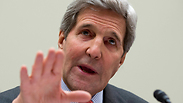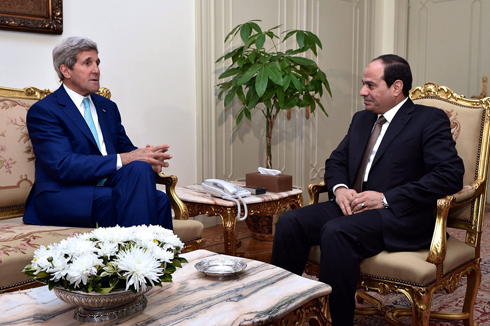
US Secretary of State Kerry
צילום: AP
Kerry talks ISIS fight, Israel-Palestinian peace in Egypt visit
Kerry's talks with Abbas and King Abdullah II are likely to focus on economic crisis facing Palestinian Authority and could also include Egyptian President Sisi.
US Secretary of State John Kerry arrived Friday in the Egyptian resort of Sharm el-Sheikh where he is to meet President Abdel Fattah al-Sisi to discuss the fight against ISIS. The top US diplomat, who is attending an investment conference in the Red Sea resort, will also meet Jordan's King Abdullah II and Palestinian President Mahmoud Abbas.
Egypt hopes the foreign investor conference will jump-start its battered economy while showcasing international support for Sisi, who has positioned himself as a frontline ally in the regional fight against Islamist militants.
The former general led the army's ouster of elected President Mohammad Morsi in 2013 and then resigned from the military to stand in 2014 elections.
Washington, which initially shunned Sisi over his deadly repression of Morsi's Muslim Brotherhood and stalled democratic reforms, has been forced to acknowledge it cannot isolate the biggest military force in the Arab world while ISIS pushes to extend its influence in the region.

US Secretary of State Kerry meets with Egyptian President al-Sisi in Cairo (Photo: EPA) (צילום: EPA)
Washington froze a chunk of its $1.5 billion in mostly military annual aid to Cairo but has delivered Apache helicopters to the Egyptian military, which is fighting al-Qaeda and Islamic militants sheltering in the Sinai peninsula.
Kerry's talks with Abbas and King Abdullah II are likely to focus on the economic crisis facing the Palestinian Authority and could also include Sisi.
"We continue to be concerned about the PA," a State Department official told reporters traveling with Kerry on his plane.
"It's really part of the continuous, ongoing conversation we're having with the critical stakeholders here," the official said, asking not to be named.
Last month, the US voiced fears that the Palestinian Authority may be teetering on the brink of collapse because of a lack of funding, as Israel withholds taxes and donor aid stalls.
Kerry led a bid last year to try to reach an Israeli-Palestinian peace deal, but his efforts collapsed amid bitter recriminations by both sides.
From the divers' paradise of Sharm el-Sheikh, Kerry will fly to Lausanne in landlocked Switzerland Sunday for fresh negotiations with his Iranian counterpart Mohammad Javad Zarif.
Talks with global powers for a deal reining in Iran's suspect uranium enrichment program in return for sanctions relief are reaching a critical stage as a March 31 deadline for a political framework accord looms.
With uncertainty still surrounding the deal, the State Department has not said how long Kerry will stay in Lausanne, nor when he is expected to return to Washington. Zarif is also due to meet with EU partners Britain, France and Germany in Brussels Monday.
"There's no deal yet," State Department spokeswoman Jen Psaki insisted on CNN Thursday. "The primary objective of any deal is to prevent Iran from acquiring a nuclear weapon," she added.
But the negotiations fuelled political tensions in Washington earlier this week when 47 Republican senators wrote to Iran warning that Congress could modify any deal struck with President Barack Obama's administration.
Kerry hit out at that suggestion, saying it was "flat wrong," and German Foreign Minister Frank-Walter Steinmeier on a visit to Washington also denounced the political stunt, which he feared could undermine the talks.
"This is not just an issue of American domestic politics, but it affects the negotiations we are holding in Geneva," Steinmeier said before meeting with lawmakers on Capitol Hill.
"Obviously, mistrust is growing on ... the Iranian side (as to whether) we are really serious with the negotiations."
Amid the fallout from the open letter, Iran's Supreme Leader Ayatollah Ali Khamenei also warned the country's top clerical body Thursday against "deceitful" world powers.
President Hassan Rouhani "has selected a nuclear (negotiating) team who are truly good, trustworthy and hardworking," he said, quoted by ISNA news agency, whereas "the other party is deceitful and stabs in the back."










